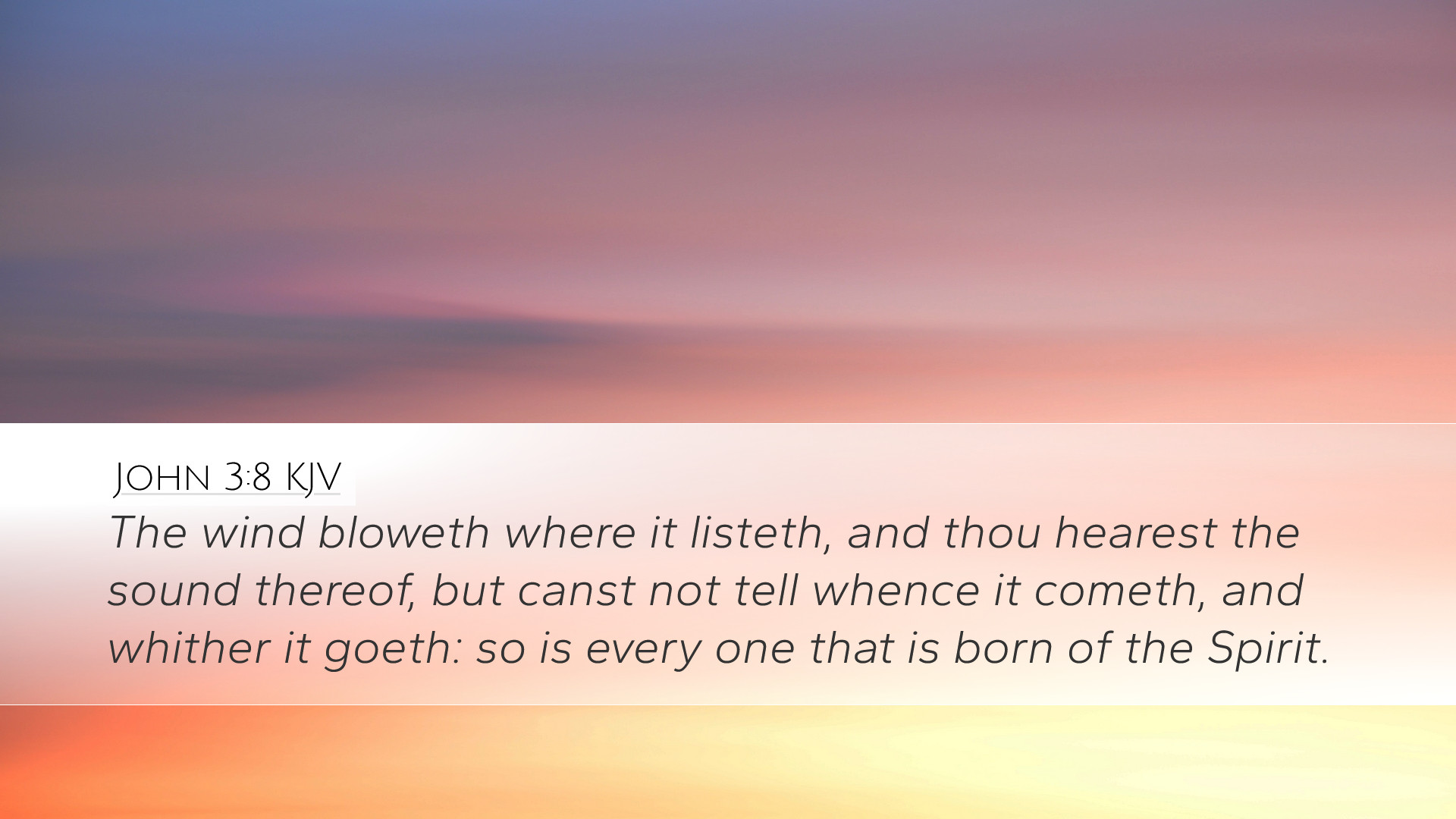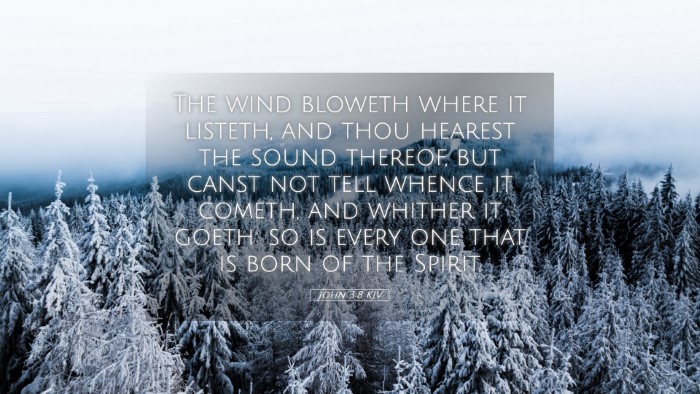Commentary on John 3:8
Verse Text: "The wind blows where it wishes, and you hear its sound, but you do not know where it comes from or where it goes. So it is with everyone who is born of the Spirit." (John 3:8, ESV)
Introduction
The context of John 3:8 is crucial for understanding its profound implications regarding spiritual regeneration and the work of the Holy Spirit. In this passage, Jesus is speaking to Nicodemus about the nature of spiritual rebirth, highlighting that the movements of the Spirit are as mysterious and sovereign as the wind. This commentary synthesizes insights from Matthew Henry, Albert Barnes, and Adam Clarke to explore the theological richness of this verse.
The Nature of the Spirit's Work
John 3:8 introduces the role of the Holy Spirit in the believer's life. Jesus employs the metaphor of the wind to illustrate how the Spirit operates:
- Voluntary and Sovereign: As the wind acts according to its own will, the Holy Spirit moves freely without human constraint. Matthew Henry emphasizes this point, noting that regeneration is not something humans can control or predict.
- Invisible Yet Evident: Just as the wind's effects can be observed, the work of the Spirit is often invisible yet manifest in the lives of believers. Albert Barnes reminds us that while we cannot see the Spirit, we can witness the transformation it brings.
- Unpredictable: The unpredictability of the wind serves as a metaphor for the workings of the Spirit in the process of salvation. Adam Clarke emphasizes that, like the wind's direction, the Spirit can move where it desires, highlighting God's sovereignty in whom He chooses to regenerate.
The Implications of Being Born of the Spirit
Understanding the implications of being born of the Spirit is essential for both theological discourse and pastoral practice. This rebirth is transformative and multifaceted:
- New Life: The new birth signifies a radical change in one’s nature and position before God. Adam Clarke points out that this transformation results in a new allegiance and a new nature, which aligns with God's will.
- Relationship with God: Being born of the Spirit establishes a direct relationship with God, allowing believers to reflect His traits in their everyday lives. Matthew Henry observes that this relationship leads to a life empowered and directed by God’s Spirit.
- Membership in God’s Kingdom: Barnes emphasizes that those born of the Spirit are incorporated into God’s Kingdom, granting them rights and responsibilities that come with being children of God.
The Role of Faith and Human Response
While the work of the Spirit in regeneration is sovereign, human response plays a critical role in the life of faith:
- Faith as a Response: Understanding the necessity of faith is vital. The new birth is a divine act, yet human beings are called to respond in faith. Clarke highlights that this response is essential for experiencing the transformative power of the Spirit.
- Dependence on the Spirit: The believer’s journey is one of continual dependence on the Holy Spirit. As believers, recognizing our reliance on the Spirit for growth and understanding is crucial, as emphasized by Barnes.
- Evidence of the New Birth: The fruits of the Spirit serve as evidence of one’s regeneration. These traits reflect the work of the Holy Spirit and should be evident in a believer's life, enhancing their witness and testimony to the world.
Theological Reflections
The theological implications of John 3:8 extend to numerous doctrines within Christian faith:
- Doctrine of Regeneration: This passage underscores the necessity of regeneration, as highlighted by all three commentators. It affirms that salvation is initiated by God, not man, and that it is a work of divine grace.
- Sovereignty of God: The sovereignty of the Holy Spirit in regeneration is a profound theological assertion. God’s prerogative to choose whom He will save is a cornerstone of Reformation theology, echoing the insights of Henry and Clarke.
- Essence of the Christian Experience: Experiencing the new birth and living by the Spirit forms the essence of the Christian life. It infuses meaning and purpose into the believer's existence, cultivating a life that is responsive to God’s leading.
Conclusion
John 3:8 invites profound contemplation on the work of the Holy Spirit and the nature of spiritual rebirth. By employing the metaphor of the wind, Jesus reveals the mystery, sovereignty, and transformative power of the Spirit in our lives. For pastors, students, theologians, and Bible scholars, this verse encapsulates crucial truths about the nature of God’s grace, the necessity of faith, and the evidence of the Spirit's work in believers. Understanding and embracing these truths leads to a deeper appreciation of God’s ways and a more profound commitment to living out the implications of the Gospel.


